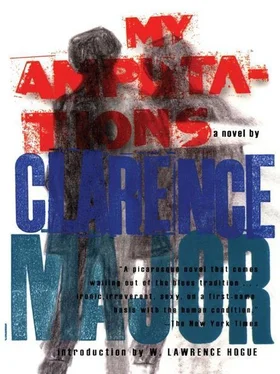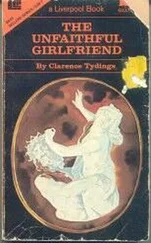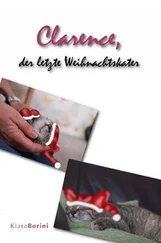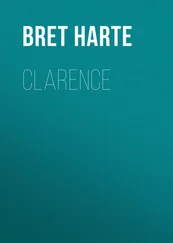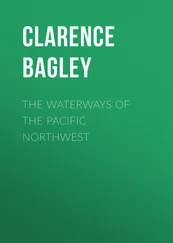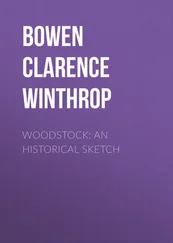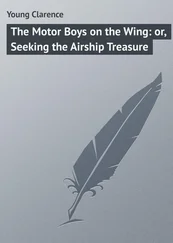Clarence Major - My Amputations
Здесь есть возможность читать онлайн «Clarence Major - My Amputations» весь текст электронной книги совершенно бесплатно (целиком полную версию без сокращений). В некоторых случаях можно слушать аудио, скачать через торрент в формате fb2 и присутствует краткое содержание. Год выпуска: 2008, Издательство: Fiction Collective 2, Жанр: Современная проза, на английском языке. Описание произведения, (предисловие) а так же отзывы посетителей доступны на портале библиотеки ЛибКат.
- Название:My Amputations
- Автор:
- Издательство:Fiction Collective 2
- Жанр:
- Год:2008
- ISBN:нет данных
- Рейтинг книги:5 / 5. Голосов: 1
-
Избранное:Добавить в избранное
- Отзывы:
-
Ваша оценка:
- 100
- 1
- 2
- 3
- 4
- 5
My Amputations: краткое содержание, описание и аннотация
Предлагаем к чтению аннотацию, описание, краткое содержание или предисловие (зависит от того, что написал сам автор книги «My Amputations»). Если вы не нашли необходимую информацию о книге — напишите в комментариях, мы постараемся отыскать её.
My Amputations — читать онлайн бесплатно полную книгу (весь текст) целиком
Ниже представлен текст книги, разбитый по страницам. Система сохранения места последней прочитанной страницы, позволяет с удобством читать онлайн бесплатно книгу «My Amputations», без необходимости каждый раз заново искать на чём Вы остановились. Поставьте закладку, и сможете в любой момент перейти на страницу, на которой закончили чтение.
Интервал:
Закладка:
The background of such a madman is at least of clinical interest. I strain to find something good to say. Does such a personality evolve from insecurity, a feeling of worthlessness churning beneath the facade? Mason's father didn't find his handsome mother tied to tracks. He was not deceptive — and that's not a family secret. You be the judge. Mason, here speaking: My father comes back to me often. He came back last night; with a flat wide nose, a plate in his lip, a sculptured skull, looking through a mask. From the inside of his head I now look out at you: you are wearing my face, yet you are not me. I lost a forefather in the bush — on the q.t. — one in the gas station while the Cadillac was being filled, the oil changed. My father has grown fat. He's a model of virtue yet he has cloven hooves. He smokes and rubs his red eyes. He has forgotten the taste of innocence: he has nothing to declare. His head and especially his sad eyes are not truly his own. He is up against obstructionists. He is a fat, fat man sunning himself in the sunchair. There's wet, cut grass before him: something he has accomplished: the beer he holds is his reward. My father liked seeing my mother, when they were still together, in summer prints. Now he is discussing symbolism, the conflict and exchange between Church and State, the value of a muse, with his smart girlfriend, a college dropout. His African nose flares, just slightly: this happens when he's tense, excited. He now looks less like a prince of rogues. His complexity is authentic. Skin? The inside tissue of darkness turned the blowup-blue of the Black Hole. Every night I dream of my father — now that he's, how'd ya say in Anglais? dead. Is he dead- dead? I ask ‘cause he comes cloaked in his own flesh, even now. See him coming across the night sky which is like a sheet of fifty-by-fifty black metal — used in bridge construction. He's dangerous yet undefined: he has nothing to confess. He's wet from the rain falling from the white moon. He's reachieved innocence through having emerged from that romantic ooze of damnation known otherwise as Getting-Along. The setting is not bleak not a trap and there is no charm in the spell he conjures. My father is still sad. And still. Sadness swallows him. He is also a stranger to me, as I am to my sons, my daughters. He's slightly on the lunatic fringe, yet somehow free of dereliction. At least he believes in me. He's a stranger coming in lightning, crossing the construction site. My father gives in to a dream of the werewolf. His howl sticks in his throat as he pulls himself to the edge where he falls peacefully into a muddy swimming pool in a backyard in Atlanta. I am in Chicago. A foghorn is the last sound he hears. The light from my welding rod, his last light: this is lineage. Then he recovers for me: old Clootie. Infernal Angle. There's no bilking in his action. My father's face multiplies in the night. Is there such a thing as interchangeability with one's father? I could not imagine my father a hero — Salt of the Earth. To his generation he is a constant threat because that whole generation was caught in the act —and he wasn't. He is the Marquis de Sade, the eternal infidel, Lucifer, victim of meddlers and muddled affairs. I sleep dreamless in self-defense, taking transmigration with Kafka seriously. Outside the dream, in a barbershop, he looks out the window: through it, the Deer woman walking up a path. She could be Painted Turtle's mother. All flat surfaces. My father's metabolism is slow. He worries about his feet and his heart and his ribcage and his fingers — he has arthritis. He worries about the chemical balance of his body — yet he isn't health conscious exactly, sees no trapdoors, steps on no thin ice, does not have the “Bullfrog Blues.” The moon outside above the road lights the way for my father, like D.H. Lawrence's, when he is stumbling home drunk. Except my father does not drink — is not a drunk. A lame duck, yeah, but not a scoundrel. My father has a gun in a gun-holster strapped to his chest. He is unbelievably like a Hollywood gangster in the way he carries himself. Yet he has no hideout, no illusions, no contact man, fix, hype, buster-and-screw man, no biter, no acetylene torch. He says don't be like me, be an artist. In the sand my father finds a skull-bone. He places it on his dresser. He watches it for a week then decides to paint it yellow. Why yellow, which yellow? What kind of paint? My father often feels unloved — and loved, by the wrong women, too passionately. His secret life is inflamed with the quality of hurt. His facial muscles won't relax. The nurse takes his blood count at the free clinic, his girlfriend counts his socks. Holes. A peewee soft-song man sings outside his window. He waits for the train. It arrives late. Although it is late it's still the seven-forty-seven. As though walking into a hornet's nest, he steps up onto it. Through the window he sees the rotten roof of the station. It's raining. The roof leaks. On the platform eight virgins are collecting for the March of Dimes. At his foot is a shopping bag. In it: the infamous skull-bone. He's a bagman. Smell the cool wet morning? Where's he going? He gets off in the city. We watch him walk with his bag. Slightly stooped. He enters the Magnan-Rockford building. With one of the keys on his key-ring he unlocks the basement door marked Janitor.
Mason's father, I'll have you know, wasn't a janitor for anybody —ever. Something too inconsistent in Mason's collage, back there: those shifting contradictory images. They disturb me. Chiro may have had his fingers in many pies, a thumb or two dripped (dipped in) blood, perhaps. Surely he was a peccadillo, maybe a chiseler but he was not inconsistent. It's Mason who's… Ellis Sir met the world bravely, without tosh. No rift in his life: nothing was rubber-stamped; everything done in the original. Why do I defend his father and damn him? (Well, you heard the phoney voice in the previous chapter!) Mason's father, for example, often walked — he did not use his, uh, wings or Cadillac to show off. I can see him now: he's walking along Peach Street in Atlanta. It's early morning. He looks distastefully at his surroundings. Yet he is unable to leave. He projects himself into another time, another place: the cobblestones beneath his uneasy feet are slick from too many years of slime, blood of bull-runs, urine. Here he's not full of the “B.V.D. Blues,” but a respected Model of Virtue, perhaps a doctor, a man of trust. All his life Mason's father has thought the word father and now it breaks down into two parts: “fat” and “her.” Is a father hiding the female her in himself? Another view: he's riding a bicycle high on a tightrope… Mason's father willed his wings to Mason. Remember the escape? They were made of mutation itself, of conviction, and of impeccable iron feathers. And here is Mason's fat-her as Red Charleston with a history of backdooring, listening to Duke Ellington in Kansas City directing his band through “Chocolate Shake.” Cats outside in the alley gambling, [a passage between buildings — not a path through a lovely garden, this alley]. Many of the lames in the turnout are talking trash; trotters angling for attention. Duke keeps on keeping on. Up there — big smile. It's Saturday night: somebody feels mellow, somebody else feels deadly. Frankie and Johnnie meet C.C. Rider. Coppers are pulling coats, police swinging billysticks. Some up on china white, others down on sneaky pete. Mason's father was a music lover who danced a trickbag step to Louis Jordan, to Benny Carter and his Chocolate Dandies ripping through “Cadillac Slim”: splib-oh-do-be-ooop, bob-bop-ah-do-ooop… Chiro understood the Body by Fisher. Saturday night: the lights are still greasy from the baptized bird. All around Mason's father a hawk flapped and stabbed. He did the Cootie Crawl, too. He moved through honkytonk changes, buying drinks for unemployed dudes, hot mamas, Kants. Completely qualified, folks. Another shot of Mason's father: in buckskin. “Got my gun, got my hoss.” He takes off with Cab Calloway toward the sunrise in one of those twenty-five minute colored shorts. He told stories of genocide and mass murder around the campfire. He worked the chain-gang, helped to build Atlanta. Chiro poured the cement like sperm. The wheels of automobiles stuck to the shadows of churches. Chiro's mother was a preacher in one of those churches, his father — a jailbird, a heel grifter, a lady-killer. He was not exactly a dangerous nightwalker but he knew them all — knew which pockets concealed their knives, their smokers; knew the crooked cops, the ladies on the lookout, the secrets of them all. Chiro hung out at card parties and Saturday night fish fries. Did the Lindy. Chased chippies. Was a cherry picker. Did the Chitterlin' Strut. Could even sing Indian rain songs. (Indians were part of his heritage, too. So were the people shipped here from the prisons of England.) Cab taught him to sing “Chop Chop Charlie Chan.” Chiro strutted around in a zoot suit and quoted the scriptures better than a country preacher. Was perfectly at home in any schizophrenic city — especially Atlanta. Even his pain was sort of sweet: “Sickness and Benny Goodman's Sextet.” “Buttermilk and Fats Waller.” “Neckbones and riverbeds of garbage.” Mason's father didn't come from the Broken Hill in Australia, never walked in the tides of the Coral Sea: he was of the place where streetfights and cockfights reigned. Here is an easy early snapshot of Mason's father: fingernails neatly cut and polished; felt hat at rakish angle; no scar, no conk, no smell of Okefenokee, red dirt, not even Cadillac grease, perfume, Royal Crown. A cat rejected by the World War Two draft board, he was a sharpshooter. Some swore he had one eye, nine fingers. At least one lady called him Mack the Knife, one other Fisheye. But they were both confused. At the point of orgasm, one lady grabbed his Saturday Night Special from its place tucked in his pants at the base of his spine and pulled the trigger — she was that excited. The bullet went through the mattress and lodged in the rattan carpet beneath the bed. He bit her neck till he got blood. Yet this witches' brew was not his thing. He could do the Twist. Had no real use for the Frenzy — untying the knot. Mason's mother wrote this historic letter to his father in March, 1941: “You are a beast. You had your son by the hand, remember, and his steps equalled one-fourth of each of yours on that hot dirt road in an uncertain place where the Cadillac broke down. You always walked too fast. And your daughter: what of her? Haven't you betrayed her, too? I'm not surprised that the woman in the passing car gave you a ride into town and her car broke down, too: You're just bad luck, Mister. You got the ‘Dipper Mouth Blues,’ and you look like a forkbeard two days out of water. I remember many nights when I didn't want it and you forced me: I hate you for raping me. Good-bye, Melba.” Although Chiro was a conscious dresser, he never wore gold suspenders and tap-dancing shoes (although, in The Memoirs of Madame Rose Marie Butler Williams, Grande Queen of The Best Time in Town Bar and Hotel on Butler Street , Chiro did wear shoelaces made of gold thread.) Near the end of his life, Mason's father ate regularly in the restraurant he once owned. The lady next door always tried to get him to go to church with her. He never did. So she gave him church flowers she brought from the altar. He was by now an old man bent low in his dim room. No other person ever entered it. It was crammed with the bad odor of an old man who smoked too much, whose wings were damaged and musty…
Читать дальшеИнтервал:
Закладка:
Похожие книги на «My Amputations»
Представляем Вашему вниманию похожие книги на «My Amputations» списком для выбора. Мы отобрали схожую по названию и смыслу литературу в надежде предоставить читателям больше вариантов отыскать новые, интересные, ещё непрочитанные произведения.
Обсуждение, отзывы о книге «My Amputations» и просто собственные мнения читателей. Оставьте ваши комментарии, напишите, что Вы думаете о произведении, его смысле или главных героях. Укажите что конкретно понравилось, а что нет, и почему Вы так считаете.
